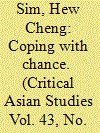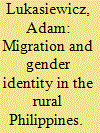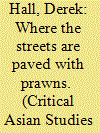|
|
|
Sort Order |
|
|
|
Items / Page
|
|
|
|
|
|
|
| Srl | Item |
| 1 |
ID:
108325


|
|
|
|
|
| Publication |
2011.
|
| Summary/Abstract |
This article explores mobility transitions in Thailand through the particular experience of two villages in Northeast Thailand over the period from the early 1980s through to 2009. The authors show through the mobility histories of Ban Non Tae and Ban Tha Song Korn that, while rural settlements may have always had a greater degree of mobility than the sedentary peasant paradigm suggests, important changes have taken place over the last quarter of a century in how that mobility is manifested. Personal mobility has increased; the migration of women has become as prevalent as that of men; and a mixture of daily commuting and more permanent moves have replaced seasonal circulation. In the process, mobility has created complex, multi-sited households; has led to a growing geriatrification of farming; and has altered the basis for livelihood sustainability and village resilience. Case studies of two individuals highlight these dynamics and add color to the themes the authors present. In making clear households' changing spatial signatures, the authors also seek to show how national and international development processes are imprinted in village and household histories.
|
|
|
|
|
|
|
|
|
|
|
|
|
|
|
|
| 2 |
ID:
108327


|
|
|
|
|
| Publication |
2011.
|
| Summary/Abstract |
This article examines the nature of agrarian transition and rural transformation in the Malaysian state of Sarawak on the island of Borneo. Although rural change is not new on the island, the speed and penetration wrought by current processes of change is far-reaching. The consequences have been uneven for indigenous communities: some have benefited from infrastructure projects like roads and schools and from proximity to employment in urban centers, but others have lost their land and face a depleted natural resource base and increasing difficulties in making a living in the village. This article argues that these processes are gendered in nature as men and women decide either to leave (whether singly or with their families) or stay put in the villages. Little research has been done on the gender dimension of agrarian transition in Sarawak. This article pieces together fragmented accounts to present a picture of how women effect as well as are affected by these changes.
|
|
|
|
|
|
|
|
|
|
|
|
|
|
|
|
| 3 |
ID:
108326


|
|
|
|
|
| Publication |
2011.
|
| Summary/Abstract |
Remittances associated with labor migration have been hailed by many as the most direct form of development to rural migrant-sending areas of the Global South, but focusing only on the quantity of cash flows does little to contextualize how migration has transformed social structures in rural areas. Through a qualitative focus on divisions of agrarian labor and decision-making, this article illustrates how the out-migration of men from rural areas of the Philippines is challenging preexisting gender ideologies of agricultural labor. The article examines how wives "left-behind" by their migrant husbands negotiate forms of farm work and responsibility that are culturally prescribed as "masculine." While a number of studies have detailed how female migration can destabilize conventional gender roles-as housebound husbands are shown to take up social reproductive work often considered "feminine"-the impacts of male migration on the participation of housebound wives in productive farming practices has been less studied. This article presents several vignettes of stay-at-home mothers who venture into farming and it analyzes how these women interpret their own gender identity.
|
|
|
|
|
|
|
|
|
|
|
|
|
|
|
|
| 4 |
ID:
108322


|
|
|
| 5 |
ID:
108324


|
|
|
|
|
| Publication |
2011.
|
| Summary/Abstract |
Class is back on the critical social research agenda in ways that are different from the class reductionism of "old" Marxism. Contemporary theorizations integrate culture, gender, and other axes of identity in interpreting socioeconomic processes. This article argues that the intersection of culture, gender, and class cannot adequately explain complex socioeconomic processes without sensitivity to migration or the legal status of individuals and bodily qualities conditioned by that legal status. This argument is made in the context of ethnic Shan migrants working in agricultural production in the Doi Soong (pseudonym) Royal Development Project site in northern Thailand. There, the "success" of the Project is fundamentally predicated on the simultaneous representation and erasure of Shan labor, whose exploitability is shaped not only by the dynamics of culture, gender, and class, but also by the migrants' historically contingent and lived experience as migrant (mobile) and precarious/undocumented (noncitizen) bodies.
|
|
|
|
|
|
|
|
|
|
|
|
|
|
|
|
| 6 |
ID:
108323


|
|
|
|
|
| Publication |
2011.
|
| Summary/Abstract |
As the proportion of the gross domestic product of Southeast Asian countries accounted for by agriculture continues its long-term decline, it is natural in studying regional migration flows to emphasize the ways people are moving away from farming. Across the region, however, millions of people continue to migrate both within and across international borders to take part in agricultural production. Many of them are moving to grow "boom crops" like cocoa, coffee, oil palm, rubber, and shrimp, all of which have seen rapid expansion over the last two decades. In this article, the author provides a comparative survey of the links between crop booms and migration in Southeast Asia, arguing that this migration has taken three main forms: relatively autonomous and "spontaneous" migration by households or individuals looking to set up as boom crop-growing smallholders; a "transmigration" model in which parastatal agencies or private corporations with state support help migrants to relocate so that they can take part in organized farming schemes with at least some smallholder component; and migration for the purpose of working as waged laborers for plantations or richer smallholders growing boom crops. The importance of these types of migration has varied across crops. In the conclusion, the author makes several points about the politics of migration and crop booms.
|
|
|
|
|
|
|
|
|
|
|
|
|
|
|
|
|
|
|
|
|